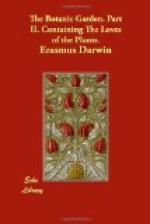P. It is a metaphysical question, and requires more attention than Sir Joshua has bestowed upon it.—You will allow, that we are perfectly deceived in our dreams; and that even in our waking reveries, we are often so much absorbed in the contemplation of what passes in our imaginations, that for a while we do not attend to the lapse of time or to our own locality; and thus suffer a similar kind of deception as in our dreams. That is, we believe things present before our eyes, which are not so.
There are two circumstances, which contribute to this compleat deception in our dreams. First, because in sleep the organs of sense are closed or inert, and hence the trains of ideas associated in our imaginations are never interrupted or dissevered by the irritations of external objects, and can not therefore be contrasted with our sensations. On this account, though we are affected with a variety of passions in our dreams, as anger, love, joy; yet we never experience surprize.—For surprize is only produced when any external irritations suddenly obtrude themselves, and dissever our passing trains of ideas.
Secondly, because in sleep there is a total suspension of our voluntary power, both over the muscles of our bodies, and the ideas of our minds; for we neither walk about, nor reason in compleat sleep. Hence, as the trains of ideas are passing in our imaginations in dreams, we cannot compare them with our previous knowledge of things, as we do in our waking hours; for this is a voluntary exertion; and thus we cannot perceive their incongruity. Thus we are deprived in sleep of the only two means by which we can distinguish the trains of ideas passing in our imaginations, from those excited by our sensations; and are led by their vivacity to believe them to belong to the latter. For the vivacity of these trains of ideas, passing in the imagination, is greatly increased by the causes above-mentioned; that is, by their not being disturbed or dissevered either by the appulses of external bodies, as in surprize; or by our voluntary exertions in comparing them with our previous knowledge, of things, as in reasoning upon them.
B. Now to apply.
P. When by the art of the Painter or Poet a train of ideas is suggested to our imaginations, which interests us so much by the pain or pleasure it affords, that we cease to attend to the irritations of common external objects, and cease also to use any voluntary efforts to compare these interesting trains of ideas with our previous knowledge of things, a compleat reverie is produced: during which time, however short, if it be but for a moment, the objects themselves appear to exist before us. This, I think, has been called by an ingenious critic “the ideal presence” of such objects. (Elements of Criticism by Lord Kaimes). And in respect to the compliment intended by Mr. Fielding to Mr. Garrick, it would seem that an ignorant Rustic at the play of Hamlet, who has some previous belief in the appearance of Ghosts, would sooner be liable to fall into reverie, and continue in it longer, than one who possessed more knowledge of the real nature of things, and had a greater facility of exercising his reason.




